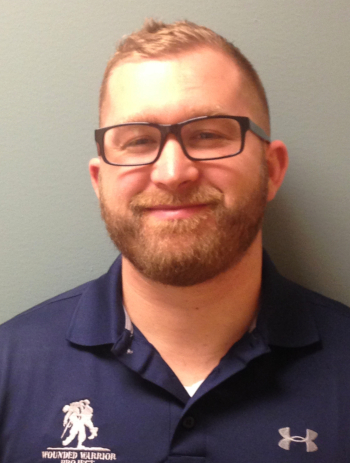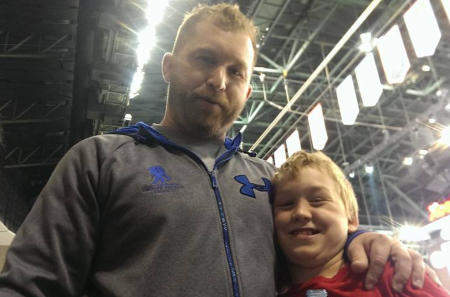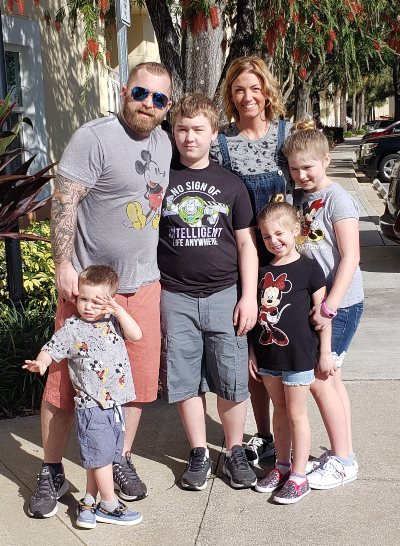I’ve Been There in The Darkness

Former Marine Daniel Hanson brings his own light to suicide prevention efforts.
There was a time when I didn’t think I could be saved. I had recently separated from the Marines and struggled with my transition to the civilian world. I had also just lost my brother — also a Marine — to suicide. I know what it feels like to think you have no options left. I eventually attempted suicide.
Today, my mission is to teach others that there are many reasons to live. And there are many reasons to intervene even when you think someone has made up their mind to end their life.
You could save someone.
For me, the road was not easy. But once I found my purpose, I began to continuously work on myself so that I could tell my story in positive ways and help others.
Losing a Brother, Losing Myself
I was on active duty in the Marines from 2003 to 2007, including time in Ramadi, Iraq. Military service runs in my family; two of my four siblings served in the Marines, and my mom was in the Army.
After active duty, I was a Department of Defense contractor while working for the Minnesota Army National Guard, helping other veterans transition out of the military. I handled my own transition as best I could — until my younger brother Travis died by suicide.
Losing my brother Travis, and also a fellow Marine named Jon, to suicide put me on a two-year downward spiral. I drank a lot. I got into fights. I got arrested.
None of my siblings talked about feelings and emotions, so after Travis died, rather than talking to anyone about how I felt, I was like a dead man walking. My life was out of control for those two years.
Eventually, my burden felt so heavy that I tried to kill myself. Barely able to hold my phone because I was sobbing, I texted my siblings a farewell and asked them to please take care of my children. I couldn’t wake up every day wishing I were dead. I couldn’t keep going to bed at night with my burden of shame and guilt.
I took a bunch of pills — handful, after handful, after handful. I was in the hospital and then on a 72-hour hold at the VA medical center. When I was discharged, I just went back to work the next day; I pretended it didn’t happen.

A couple of months later, I got arrested. I was sitting in my jail cell, knowing that I was supposed to pick up my son. I was destroying my own life — and my children’s lives.
That’s when I decided to change. I told myself, “I am going to be a good dad. I am going to be a good man. And I’m going to use all of this hurt and pain to do everything I can to help others.”
Rising from the Ashes
I went into inpatient rehab for a year. I also went to the VA for cognitive therapy and counseling. When I finished treatment, I started volunteering anywhere I could: at the homeless shelter, at the VA, anything I could do to help other people. I went back to school, finished a master’s degree, and then started another. I didn’t do it to collect degrees; I wanted to learn more information on how to help other people. I figured out that what helps me more than anything is helping others.
I felt that I could finally share the story of my brother and talk about what happened in Iraq. When I talk to other veterans, they can identify with some of my struggles.
It’s amazing how freeing it is to tell one’s story. I also share my experiences because I want people to know that if I can get through, they can get through.
I teach suicide prevention with a different perspective because I want people to know that I’m here even though I didn’t think I could be saved. For the longest time, I was determined to take my own life.
Then I realized the ripple effects of suicide. I wouldn’t be there for my children, or my wife, or my siblings. I began to see that they loved me, and they needed me. Looking back, I don’t think I’d be alive if it weren’t for my mom, my dad, and my sisters. Other people wrote me off, but my family told me that they love me. They picked me up and dropped me off at counseling and kept me going. I kept working on myself because of the people who love me.
Ask the Question
So, when people say that someone cannot be saved, I say, “That’s not true — I’ve been there.” By intervening, you might save a life. You might be the right person to ask the important question: “Are you thinking about suicide?”
Unfortunately, we tend to overthink it: “What if I say the wrong thing? What if I make it worse?” In my experience, most people who have suicidal thoughts simply want to be acknowledged.
Fear keeps people from asking the question. In many tragic cases, people take their own lives because others around them don’t want to ask the question. Those of us who are healthier need to step up and ask the question. We need to train people to be comfortable with asking the question.
The Hard Facts
According to the National Institute of Mental Health, 47,000 people in the U.S. die by suicide each year. Twenty veterans take their own lives on any given day. Suicide is the 10th most common cause of death in the U.S.
There are many barriers to people with suicidal ideation getting help. For some, it is the erroneous belief that people are sick and never going to get better.
It’s frustrating to hear people ask, “What am I going to do for them, anyway?” When it comes to preventing suicide, a caring person who is aware can make a huge difference. You don’t need to be a first responder or a doctor. You can help a broken heart start to heal.
A common misconception is that only those who have a dysfunctional life struggle with suicidal thoughts. This causes people to stop paying attention to others who might be struggling. It is often not the person you were thinking of — because suicide can affect anyone.
The COVID-19 pandemic has added stress to our lives. But no matter how bad things get, there’s always someone who wants you alive. There’s always someone who would love to be there for you, to have a cup of coffee with you. Reach out for help.
If you need immediate help, call 1-800-273-TALK (8255). Wounded Warrior Project® (WWP) is also available to connect veterans and their families to programs, services, and resources that can help.

About Daniel Hanson, M.A.
Daniel Hanson is a U.S. Marine veteran and outreach specialist with Wounded Warrior Project. He volunteers with suicide prevention organizations and is on the board of the Minnesota Center of Suicidology.
Daniel is safeTALK-certified and trains others on suicide prevention methods. He’s a master trainer for LivingWorks’ Applied Suicide Intervention Skills Training (ASIST). He actively teaches and participates in NAMI’s Survivor Voices, a program that trains men and women who have lost someone to suicide to talk about their loss in productive ways.
Daniel is married and has four children. He serves as a mentor at Minnesota Adult & Teen Challenge, where he received treatment. His daily work with Wounded Warrior Project allows him to help veterans and military families and inform the public on how to support veterans. He has spoken before the U.S Senate and the U.S. House of Representatives about veteran issues.